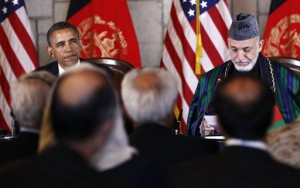Special to WorldTribune.com
By Brian M Downing, FreePressers.com
President Obama whisked into Afghanistan unannounced, inked a somewhat nebulous yet significant agreement with Afghan president Hamid Karzai, then quickly returned home. It was an impressive diplomatic coup that guarantees an appreciable U.S. presence in the country over many years, for better or worse.
Many regional powers wanted no such arrangement and much preferred a quick U.S. departure – and perhaps also an embarrassing one. But U.S. military forces will remain in Afghanistan for as many as twelve years. Their mission is thought to exclude sizeable combat roles against the insurgents in the south and east, though the miscellany of terrorist groups in eastern Afghanistan and northern Pakistan will remain prime targets.

The Taliban must be keenly disappointed in the arrangement. They wanted the U.S. out and thought they had worn down Washington’s resolve in a stalemated war of attrition over the last several years. They further thought they had the upper hand, militarily or at least in negotiating position, with the Karzai government. As it is now, however, the Taliban face a weak though partially functional Afghan army (ANA) that, critically, will be backed for another decade by American logistics, air power, and rapid response forces.
The agreement also solidifies the positions of non-Pashtun peoples in northern Afghanistan. The Tajiks, Uzbeks, Hazarras, and Turkmen will have U.S. military and developmental aid well into the future. The stalemate and war of attrition are not promising from the Taliban’s position. They face an endless war, backed only by Pakistan – a country of dubious stability and diminishing strategic affinity.
It is unclear if the U.S.-Afghan deal will make the Taliban more willing to enter into meaningful talks in the short term. They are likely to have felt that the Koran burning and atrocities had undermined the U.S. position at home and in the eyes of most Afghans. Not so, evidently. The Taliban may seek to inflict ruinous casualties on the ANA in their impending summer offensive. If successful, they have a new strategic situation. If unsuccessful, they will face an unpromising war of attrition – or they may feel the need to seek a settlement.
The generals who run Pakistan’s foreign affairs (and too much of domestic matters as well) have been seeking to oust the U.S. from Afghanistan for several years now. They have long backed the Taliban as representing their anti-Indian interests and were alarmed by the rise of Indian influence in Afghanistan once the Taliban was driven out in 2001 then seemingly replaced by northern Afghans close to New Delhi.
The Pakistani generals wanted to see the Taliban back in power, where they will help the generals call the shots in Afghanistan and shape commerce between Central Asia and Pakistani ports on the Arabian Sea. The Washington-Kabul agreement presents them with several decided problems and few good options. They can limit their objectives to limited Taliban influence in southern and eastern Afghanistan or press the Taliban and its related insurgents such as the Haqqani network to wreak havoc in Afghan cities and prevent any semblance of stability for Afghanistan, the U.S., and perhaps most importantly, their nemesis in New Delhi. But it was bombings and assassinations like that which led Karzai to move closer to the U.S.
The recent agreement is a significant victory for northern Afghans and for India as well. Northerners greatly feared that the U.S. would withdraw and Karzai would give too much to the Taliban – if not preside over their reconquest of the country.
The continued U.S. presence will provide backbone to the ANA in the south and a formidable basis for resistance in the north in the event that insurgents are able to retake the south and east. More assured with Karzai now, northerners may help build a functioning government, which has long eluded the country. India has won a three-fold victory. It has prevented a defeat at the hands of its Pakistani foe, ensured a position to benefit from Afghan and Central Asian commerce, and established a key position in the chess game being played with China.
China and Russia might be best seen as ambivalent about the agreement. China likely had high hopes of ousting the U.S. and establishing control, in conjunction with Pakistan, over Afghan mineral wealth. Further, China was hardly eager to see the U.S. ensconced so close to its western border and to the Central Asian resources it sees within its reach. But China benefits from the agreement as well: it reduces the likelihood of endless war and brings some hope for stability in the country.
Similarly, Russia has never been eager to see a protracted U.S. presence along its southern periphery, especially since the U.S. was already expanding NATO into eastern Europe. However, Russia reaps two benefits from the agreement. First, the U.S. will continue to grind down Islamist militancy, which Russia fears will spread into Uzbekistan, Tajikistan, and Kyrgyzstan – former Soviet republics still in Moscow’s sphere. Second, Russia will have a geopolitical counterpoise to Chinese expansion into Central Asia.
Though negotiated and signed by the U.S., the agreement brings relatively little to the U.S., economically or geopolitically. The U.S. has no reliable export route from Afghanistan. Routes through Pakistan are unreliable and routes through Iran are impossible. Exports routes through Russia and its satellites are long, expensive, and of unclear long term reliability.
The U.S. has, however, secured a base from which it can attack Al Qaida and kindred groups in Afghanistan and Pakistan. Further, it has established a position that will irk China yet at the same time offer opportunities of common purpose.
Brian M Downing is a political/military analyst and author of The Military Revolution and Political Change and The Paths of Glory: War and Social Change in America from the Great War to Vietnam. He can be reached at brianmdowning@gmail.com.

You must be logged in to post a comment Login